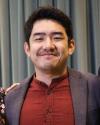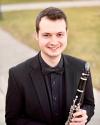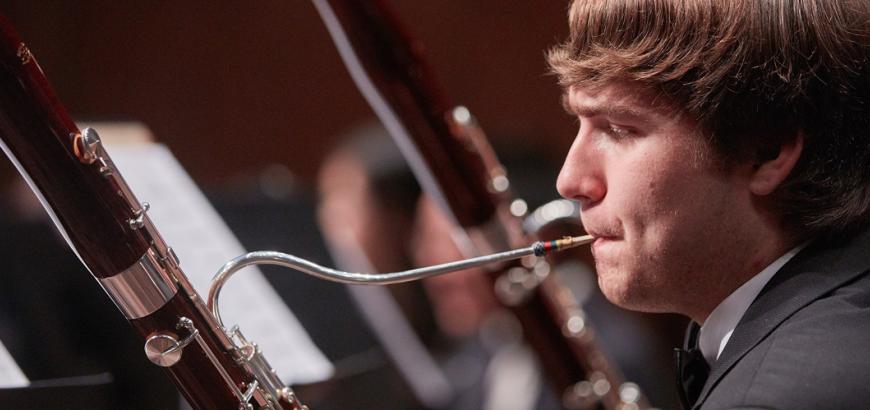The UW Concert and Campus Bands present "Sonic Luminescence," performing music by Julie Giroux, David Maslanka, Eric Whitacre, and others.
Program
UNIVERSITY OF WASHINGTON CONCERT BAND
David Stewart, conductor
Firework (1992) – Jan Van Der Roost (1956)
At Morning’s First Light (2004) – David Gillingham (1947)
Our Cast Aways (2018) – Julie Giroux (1961)
Illumination (2013) – David Maslanka (1943 - 2017)
UNIVERSITY OF WASHINGTON CAMPUS BAND
Roger Wu Fu, conductor
Commando March (1943) – Samuel Barber (1910 - 1981)
Lux Aurumque (2005) – Eric Whitacre (b. 1970)
Sunrise at Angel’s Gate (2001) – Phillip Sparke (b. 1951)
Program Notes
Jan Van der Roost studied trombone, history of music and musical education at the Lemmensinstituut in Leuven (Louvain) and continued his studies at the Royal Conservatoires of Ghent and Antwerp, where he qualified as a conductor and a composer. At present, he teaches at the Lemmensinstituut in Leuven (Belgium), is special guest professor at the "Shobi Institute of Music" in Tokyo, guest professor at the "Nagoya University of Art" and visiting professor at Senzoku Gakuen in Kawasaki (Japan). Besides being a prolific composer, he is very much in demand as an adjudicator, lecturer, clinician, and a guest conductor: his increasing musical activities brought him to more than 40 different countries in 4 continents, whereas his compositions are being performed and recorded all over the world. Early in 2001, a full CD containing 4 of his works for Chamber Orchestra was released with EMI Classics while the Slovakian Radio Symphony Orchestra (Bratislava) recorded 3 of his compositions in the same period, released early 2003 by the German label "Valve-Hearts". Early 2004, "PHAEDRA RECORDS" will bring out another "classical" CD with exclusively his compositions, containing solo concertos for trumpet, guitar and horn. As is the case with several other works by Van der Roost, Firework demonstrates the power and virtuosic capabilities of the concert band.
Whether portraying the agony of war or the hopefulness of a new day, David Gillingham is a master of expressionism, and his music provides the listener with a powerful sensorial experience. In At Morning’s First Light the composer has drawn inspiration from hymns and poetry. “I envision myself as a servant of humanity expressing a myriad of emotions, thoughts and feelings that cannot be expressed through words.”
"For Those who rescue, Those who get rescued and especially for Those whose rescue never comes."
6.5 million companion animals enter animal shelters every year and 2.4 million of these adoptable animals are put down. These numbers do not include the thousands who suffer in silence. Thanks to thousands of caring people, these numbers are steadily decreasing, but we still have a long way to go. This work is dedicated to all those who work hard in the fight to end puppy mills, to rescue suffering pets and to provide care and medical attention to all those rescued. It is dedicated to those companions who get rescued and for those whose rescue never comes. We are all shepherds. Every living creature is in our care. Hopefully mankind will someday uphold his responsibility and become caretaker of all living things on earth. Maybe someday all humans will be humane and mankind will be kind.
- program note by composer
Illumination – lighting up, bringing light. I am especially interested in composing music for young people that allows them a vibrant experience of their own creative energy. A powerful experience of this sort stays in the heart and mind as a channel for creative energy, no matter what the life path. Music shared in community brings this vital force to everyone. Illumination is an open and cheerful piece in a quick tempo, with a very direct A-B-A song form.
- program note by composer
Commando March, Samuel Barber’s only work for winds, was premiered in Atlantic City, New Jersey,in 1943. Barber spent a short time in a branch of the armed forces that became an Air Force unit and was commissioned to write this music. Despite his commander’s directive to compose a march in quarter-tones to symbolize what the commander saw as the progressive nature of the air unit, Barber’s ingenuity took a different tack in this impressive concert march.
- program note by Brian Casey and David Holsinger
Lux Aurumque began its life as an acapella choral work that I wrote in the fall of 2000. When the Texas Music Educators Association and a consortium of bands commissioned me to adapt it for symphonic winds, I rewrote the climax and included the grand 'Bliss' theme from my opera Paradise Lost. Lux Aurumque received its premiere at the 2005 conference of the Texas Music Educators Association and is dedicated with deep admiration for my dear friend Gary Green.”
- program note by composer
Composer Phillip Sparke describes Sunrise at Angel’s Gate thusly: "Sunrise and sunset are the best times to view the [Grand] Canyon, as a sun low in the sky casts shadows that give depth and form to the vast panorama. Angel's Gate is one the many named rock formations on the northern side of the canyon, and in this piece I have tried to depict the sights of dawn there, birdsongs in the early morning sky and the gradual revelation of the canyon as sunlight reaches into its rocky depths. " Following the ethereal opening chord, solos in the oboe, English horn and bassoon embody the birdsong described by Phillip Sparke. Throughout the work woodwinds remain prevalent in providing melodic structure, particularly the oboe and the clarinet and, later, the saxophones. The brass family serves a supporting role much of the time, whether in the style of a chorale or in creating a fuller, more polyphonic texture. The gentle nature of the opening passages gives way to a sudden vivo in which the mood dramatically changes; Sparke has likened this section to "the area waking up with tourists." The upper winds exchange interlocking eighth-note/sixteenth-note patterns, leading to a call and response between solo woodwinds and muted trumpets. Muted brass instruments remain prominent throughout the remainder of the section and into the reprise of the earlier themes of the piece. Trills in the horn section provide impetus to the molto lento, reviving the rhythmic gestures of the first section's saxophone duet. As the work trails to a close, twelve tolls on the bells "remind us of our mortality" and inspire a prayerful conclusion.
- program notes by the U.S. Army Field Band
Biographies

M.M Wind Conducting, Peabody Institute of the Johns Hopkins University, 2020
M.Ed. Education, Concordia University Irvine, 2018
B.A. Anthropology, University of California Los Angeles, 2014
Recent works include producing and music directing his original musical “Yappie: The Musical” and its concept album premiere, music directing chamber operas exploring the relationship between growth and suffering in Baltimore’s contemporary opera scene, and presenting research on instrument pedagogy, choice, and personality at Ohio State University. At the Peabody Institute of the Johns Hopkins University, Roger worked as a conductor, performer, teaching assistant and faculty substitute. Through summer conducting workshops, Roger has worked with conductors including Dr. Travis Cross, Dr. Mallory Thompson, Professor Charles Peltz, Dr. Cynthia Johnston Turner, Dr. Mark Scatterday, Professor Kevin McKeown and Dr. Mitchell Fennell. Drawing from his own varied background studying anthropology at the University of California, Los Angeles, and Wind Conducting at Peabody Institute of the Johns Hopkins University, Roger seeks to combine a high standard of musical performance with a rigorous academic approach, always seeking to explore and present music in a new and different light.
Outside of music, Roger works with the mental health foundation Healthy Gamer by providing peer-delivered recovery support services as a group and personal coach. In his offtime, Roger enjoys being a mediocre cook, catching up on popular shows from half a decade ago, and biking. Roger is extremely excited to join the Husky family at UW, and get to know the PNW at large - Go Dawgs!

David Stewart is a Graduate Assistant at the University of Washington, where he is pursuing a Doctor of Musical Arts (D.M.A.) in conducting. David holds degrees in music performance and music education from Central Washington University and received a Master of Music from the University of Montana. A native of the Pacific Northwest, he attended Mercer Island High School and spent his weekends playing in the Seattle Youth Symphony Orchestra. His early experiences working with influential music educators shaped his ambition to become a band director himself. After realizing this dream and teaching at Graham-Kapowsin High School for four years, he decided to further his education and focus on conducting. As a performer, David has achieved notable success. He won his university's concerto competition as a freshman and received the National Band Association's Outstanding Musician Award. In 2018, he was featured as a soloist at the Western/Northwestern CBDNA Conference, where he delivered a standing-ovation performance of Scott McAllister's "Black Dog" for solo clarinet and wind ensemble.
Most evenings and Saturdays, you'll find David working with the Husky Marching Band, where he not only conducts but also plays a role in crafting the band’s dynamic game-day performances. He embraces the vibrant culture, community, and traditions of the Husky Marching Band and works to create memorable experiences for both participants and audiences. Beyond his musical pursuits, David enjoys mountain biking, rock climbing, and chess. He is also a trained mindfulness teacher, reflecting his well-rounded approach to music and life.
